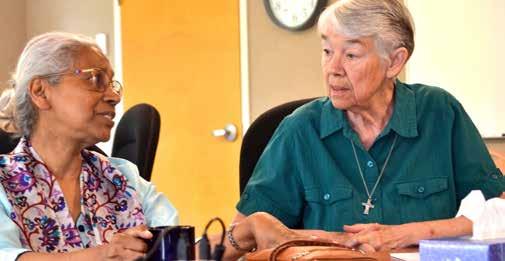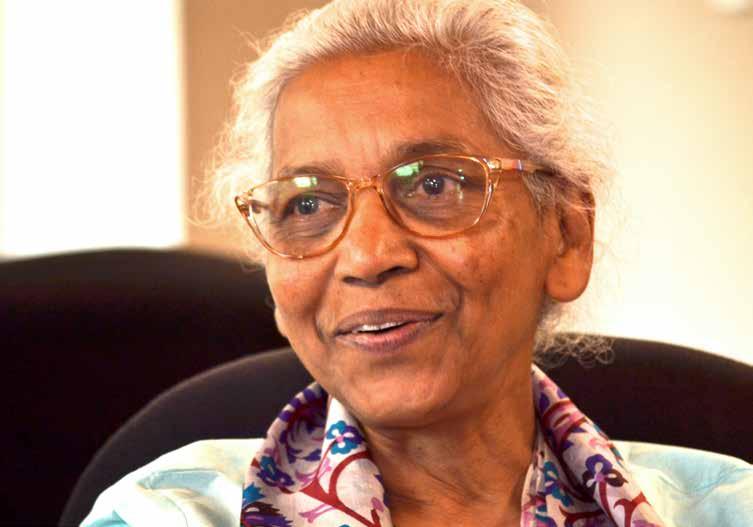
5 minute read
SND India Provinces Thriving as Congregation Celebrates 75th Anniversary
Sister Mary Sreeja Chittilappilly, SND Assistant General and Congregation Missions Coordinator from 2016-2022, visited all four SND USA regions this past summer, reporting how the Sisters of Notre Dame in India are thriving since the congregation arrived in Patna 75 years ago. Sister Sreeja was born in the state of Kerala, located in southern India. Her love and passion for the women and children of India resonates with everyone she meets.
Sister Sreeja reports that there are currently 242 Sisters of Notre Dame ministering in their home country of India. Additionally, there are 24 novices within Patna and Bangalore provinces and 35 temporary professed sisters. “The temporary professed sisters are working in the eight states where SNDs reside. A significant number of our sisters have attended or are attending university for graduate studies or professional training, such as medical doctors, nurses, social workers, etc.,” states Sister Sreeja.
Advertisement
“This is our 75th Anniversary of SNDs in India. Pioneers from the Chardon, Ohio region initiated several educational programs in both rural and urban areas of India. Notre Dame Academy Patna, Notre Dame Academy Jamalpur and Notre Dame Academy Munger, and mission stations in Sasaram and Bariarpur are some of the ministries the Sisters of Notre Dame founded. What we call ‘Julie School’ currently has 750 girls enrolled and our Notre Dame Academy Patna has 3,400 girls currently enrolled. We offer grades 1 through 10 as well as what we term ‘plus 2’ or grades 11 and 12. Our students, especially in the missions, cannot afford tuition fees which means our challenge is to find alternative funding,” explains Sister Sreeja.
“Half of our sisters serve in education with the remaining ones serving in social work, health care, interfaith dialogue, care for persons with disabilities and at Asha Kiran Home for Girls,” she explains.
Asha Kiran Home for Girls shelters girls who were trafficked, living under bridges, homeless or abused. Police or other helpline agencies rescue them and bring them to Asha Kiran. The sisters care for them, try to reunite them with family – if there is family –and if not, educate them to enable them to stand on their own. The Home is for girls under 18 years of age. Once they are 18, the government expects them to stay in a government facility or live independently.
Sister Sreeja shares, “This presents a challenge for us to continue caring for girls after 18 years of age without the support of the government. Currently we are educating girls older than 18 with job-oriented skills. None of them wish to return to the streets or to the abusive environment of the government facilities.”
The charismatic sister, whose native language is Malayalam, entered the SND congregation in 1975, making final vows in 1984. She served as Provincial Superior of Our Lady of Assumption Province in Patna, India, from 2005 to 2010. Then, from 2010 to 2022, she served as General Councilor and Congregation Missions Coordinator in Rome. In this role, Sister Sreeja was responsible for all SND global missions worldwide including Africa, Indonesia, Papua New Guinea, Peru, China, Vietnam and the Philippines.
“Professionally, I am a social worker. My interests include sociology and anthropology. I go wherever I am needed,” Sister Sreeja states. “I have traveled a great deal and have seen a lot. Now, I want to give back.” She is currently using her acquired knowledge back in India as the congregation continues its work, particularly empowering women and young girls.
According to Sister Sreeja, Hinduism is the primary religion in India. Christians account for only two percent of the population. “But we are a powerful force in India,” Sister Sreeja exclaims. “We are involved in education, healthcare and social issues including human trafficking. We also have certain pockets in India where evangelization is taking place. Our work to empower women and girls is especially challenging.”
SNDs established the Mahila Chetna Kendra (Center for Women Awake) near New Delhi, India, where the goal is to empower and awaken women and girls, especially the marginalized and oppressed. “Thousands of women and young adults have received training here,” Sister Sreeja enthusiastically reports. “Residential training programs on gender discrimination, exploitative
– Sister Mary Sreeja Chittilappilly, SND Assistant General and Congregation Missions Coordinator from 2016-2022 structures, and more are conducted for three to 10 days or longer. Attendees are organized in self-help groups of 20 to 25 women. These women are trained in various skills that will benefit their locality and also where materials and social conditions support such skills. Training includes animal husbandry, poultry, agriculturebased training, horticulture, bangle and jewelry making and more. Women are also taught bookkeeping and finance management, along with micro-credit programs for economic empowerment.”
Sister Sreeja says a unique challenge of ministering in India is its caste system. The caste system has existed in India for thousands of years and has played a significant role in shaping the occupations and roles of its people, as well as the value system of Indian society. It impacts the interactions between members of society, especially people from different levels within the caste system. It has led to segregation, hierarchy and hereditary job specialization.
“In education, upper-class students are not happy to sit with lower-class students. We challenge that thinking in our schools,” Sister explains. “Approximately 80 percent of our students are tribal with the remaining 20 percent non-tribal. We must be very careful how we integrate the schools. There is no upward mobility in a caste system, ensuring that the lower class stays down and is more easily exploited. The government makes it difficult to educate lower-class girls by not giving us any funding, so we must raise money for the students who attend our mission schools.”

Still, Sister Sreeja says, “I am very pleased that we have women who are empowered and who speak out now. We continue to find ways to fund our schools and support formation, including working with some wonderful parents who are helping us to receive some government assistance.”
Despite the numerous hoops and hurdles, the Sisters of Notre Dame continue to make a lasting impact within their country.
“In the healthcare sector, we provide vaccines, medicine, train traditional midwives and more to serve approximately 645 patients daily in one clinic in Jamalpur. This clinic was first missioned by SNDs from Chardon, OH. It is still known as the American Hospital even today,” says Sister Sreeja. “We also registered a Women’s Farmer Federation, currently functioning on our SND property. Indian women are making spices and grinding them at home on stones for eventual sale. Our goal is to find funding for a flour mill to facilitate this time-consuming, exhausting task. Some of these women have no formal education, but they have learned to sign their name when required.”
Sister Sreeja says that Sisters of Notre Dame are serving in India in a variety of roles: civil engineer, doctor, lawyer, nurse, physical therapist, pharmacist, theologian, social worker, teacher, administrator, finance manager and more.
When in India, Sister Sreeja helps with JPIC (Justice, Peace and Integrity of Creation) initiatives. One such initiative is the establishment of a legal aid program, offering legal literacy classes and working on issues concerning women.
“For years we have been working with women, and now they are empowered,” states Sister Sreeja. “Wonderful things are happening in India, and we will continue to move forward and provide a refuge for children and women being trafficked, compassionate care for those born with disabilities, vocational training for women, and a quality education for girls regardless of caste.”
Sister Sreeja concludes, “We are missioned to incarnate the love of our good and provident God wherever God calls us to serve His people.”






